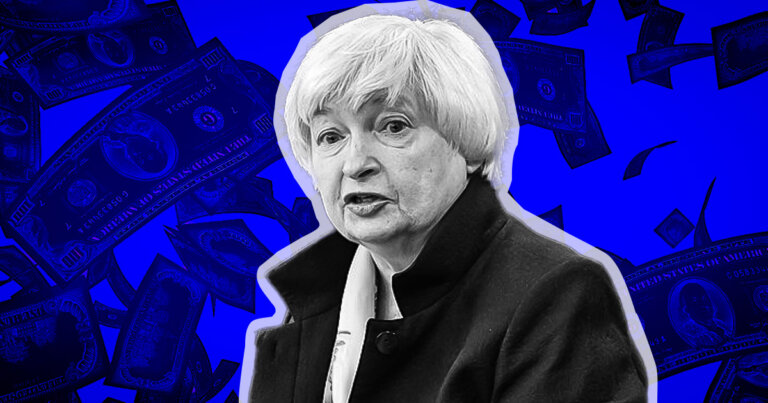 Janet Yellen claims crypto industry needs ‘additional regulation’ to plug ‘holes’
Janet Yellen claims crypto industry needs ‘additional regulation’ to plug ‘holes’ Janet Yellen claims crypto industry needs ‘additional regulation’ to plug ‘holes’
Yellen said the U.S. regulatory system is more than equipped to handle the "inherent" risks of crypto but there are "holes in the system" that need to be plugged.

Federal Reserve. Mixed by CryptoSlate
U.S. Treasury Secretary Janet Yellen said there is a need for “additional regulation” to ensure consumers and investors are protected from the “inherent” risks present in the crypto industry.
Yellen made the statement during an appearance on CNBC’s Squawk Box on June 7.
Holes in the system
She said the Treasury Department had conducted in-depth reviews of the crypto sector in recent months under the President’s Executive Order that “identified a number of risks” for consumers and investors.
Yellen said some of these risks are manageable by the U.S. regulatory system as current laws provide sufficient oversight and supervisory authorities like the SEC and the CFTC have the necessary “tools” to tackle them.
However, she added that there are “holes in the system” that need to be plugged via new rules.
Yellen did not elaborate on which areas could be improved and did not clarify further on what shape these new rules could take. She said:
“We’d like to work with Congress to see additional regulation pass.”
SEC action is appropriate
Yellen was also asked to speak about the recent SEC action against Binance and Coinbase — two of the biggest cryptocurrency exchanges on the planet — over violations of securities laws.
She refrained from making any statements about the action and said she cannot comment on the “individual cases the SEC is looking at.” However, she added that she considers such actions by supervisory agencies to be “appropriate.”
She added:
“I’m supportive, very supportive, of seeing those agencies use the tools they have.”
Bleak future, or regulatory clarity for the industry?
The crypto industry and the U.S. regulatory system are now at an impasse that can only be overcome with certainty when it comes to regulation.
The SEC taking action against Coinbase — a company that conducted an IPO in the U.S. by jumping through all the necessary regulatory hoops — and its claims that most major cryptocurrencies are defacto securities under current laws paints a bleak future for the industry in the country.
However, these cases will ultimately result in the regulatory clarity that the industry so desperately needs to thrive in the U.S.
U.S. regulators have so far refused to consider new rules for the crypto sector, with the SEC claiming multiple times that current securities laws are sufficient to regulate the industry.
Despite these claims, there are publicly documented inconsistencies among regulators’ stance toward different cryptocurrencies. It took years for regulators to contend with the enigma of Bitcoin and where it fits in the regulatory regime — with most regulators eventually admitting that it was more akin to a commodity than a security.
However, the debate continues to rage when it comes to almost every other cryptocurrency. The SEC has not listed Ethereum as a security in its cases against Binance and Coinbase so far, but other top 10 projects like Polygon and Cardano have been deemed as such.



 Farside Investors
Farside Investors 



















































































